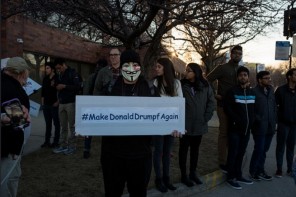Walter Breuning of Great Falls, Montana, is the oldest living man in the US. He just turned 112. (Women live longer, as we all know; Gertrude Baines, an African American woman, is 114.)
One hundred and twelve years on this earth: it is a staggering, an almost biblical, figure. Walter Breuning was born in 1896. This was the year of the first modern Olympics, held in Athens, Greece; he has lived to see them held in Beijing, China.
Mr. Breuning was also born the same year that the US Supreme Court (in Plessy v. Ferguson) established the principle that “separate but equal” facilities were compatible with our Constitutional commitments, thereby legitimating racial segregation in this country for more than fifty years; he has lived to see the election of the first African American to the highest office in the land.
Mr. Breuning was born in the year that William McKinley narrowly defeated William Jennings Bryan in one of the more dramatic and contentious presidential campaigns in modern US history; he has lived long enough to witness elections of sufficient closeness and contentiousness that they, too, ended up in the Supreme Court, hanging chads and all.
Mr. Breuning has lived through three Congressional declarations of war and more “police actions” than any of us can properly count or recall. The Soviet Union was born and died during his lifetime. Automobiles did not exist when he was born, yet he has seen men walk on the moon and spacecraft sent beyond our solar system. The first short two-minute film sequences were screened in Paris in the year of his birth; he could now call up YouTube sequences many times that length on a laptop computer or iTouch. It is a different world.
One Hundred and Twelve Years
Mr. Breuning was interviewed by PBS reporters on Monday, and his remarkably engaging and self-effacing personality reminded me of another aspect of the national character that has been far too absent from contemporary rhetoric of late: graciousness, humility, and best of all, gentleness. Here is a true gentle-man.
Perhaps anyone who lives to the ripe old age of one hundred and twelve with his intellectual and spiritual faculties intact is destined to achieve a certain level of Buddha-soul, but the suppleness and simplicity of Mr. Breuning’s ruminations on life and the world were moving past measure. In a time when one scarcely dares to turn on the television if one is not already prepared for catastrophic news, this interview offered more than a beacon of hope; it was a quiet call to moral arms, a reminder of the ways in which the character of the citizenry contributes directly to the ethical health of the republic.
The cumulative weight of Mr. Breuning’s simple answers spoke to the importance of the subtle ability to extract the ego from places, and from controversies, where it does not belong. The car stuck in traffic is not in my way; I simply perceive it that way. This person who is so aggravating, at school, in the supermarket, in the casual street-corner encounter, this person is not someone offering frustrating resistance to me and my plans; this is a person, a person in his or her own right, one whose needs and value and personhood equal, where they do not exceed, my own.
Mr. Breuning was asked, predictably, what the secret to living this long was. With equal predictability, he said there was no secret. But what he said next was interesting, and altogether unexpected from a 112-year-old man living in the depths of a dark Montana winter in a nursing home. He reminded us that none of us know how much time we’ve got. Accidents are the ethical substance of every human life, some far more devastating than others. “Nothing’s certain in this life,” he said. But what he said next was especially endearing: “And that’s why I like changes.”
The world does nothing but change; that was a recurrent refrain in his quiet reflections. To remain open to such change, to maintain the childlike spirit of egoless abandon and wonder that perhaps, just perhaps, promotes the soulful elasticity necessary to survive in this world for well over a century.
The talk turned—again, predictably enough—to the current economic downturn. Mr. Breuning was asked how this compared to the Great Depression. There is no comparison, he opined. No one today can imagine the situation then. His face turned uncharacteristically serious as he described the situation then. Multiple families were reduced to living in a single apartment, a home in which perhaps only a single person was working to support them all. Mr. Breuning was fortunate enough to work for the railroad at the time, but he and all his fellow workers, in order not to be laid off, saw a 10 percent reduction in their salary, a wicked salary cut that was not restored for more than a decade. I was uncertain whether his descriptions of the Great Depression were designed to give me hope that we are nowhere near that yet, or dread of what’s clearly still to come.
It was the last exchange that caught me up short, and made me look again at this serene face, the earnest gaze, and the thoughtful eyes, gleaming behind thick glass frames. There was something in this face that knew, knew something most of us simply haven’t lived nearly long enough to get to.
“How would you counsel future generations to be a part of their country?” he was asked. His reply was instantaneous, and even lovelier for being so.
Everybody learns from life what’s going on. And if they pay attention to everything that people do, especially helping people, that’s one big thing. A lot of people think they’re born for themselves; I don’t think that. I believe that we’re here to help other people all the way through.
“A lot of people think they’re born for themselves.” Is this perhaps what Mr. Breuning sees as the central issue facing us in this difficult time? Is it the subtle selfishness of our questions?
How can I live as long as you?
By not being so attached to living long. Accept change.
How can I find peace in this time of turmoil? By recognizing with Edgar (in King Lear) that “worse I may be yet. The worst is not/ so long as we can say, ‘This is the worst.’”
How can I achieve serenity, and enlightenment? By ceasing to desire it for yourself.
The image of people taking up meditation and other spiritual techniques because they want be enlightened tells the tale. Approached this way, we never quite see the central point, that so long as I am the desiring one, even if it is enlightenment that I am desiring, then I will never achieve it.
Enlightenment is achieved to reduce the suffering of all sentient creatures, not mine. That’s central to the Buddha-mind. And central, so suggests this remarkably thoughtful 112-year-old, to the character of a citizenry in the republic’s time of trial. “I believe that we’re here to help other people all the way through.”




